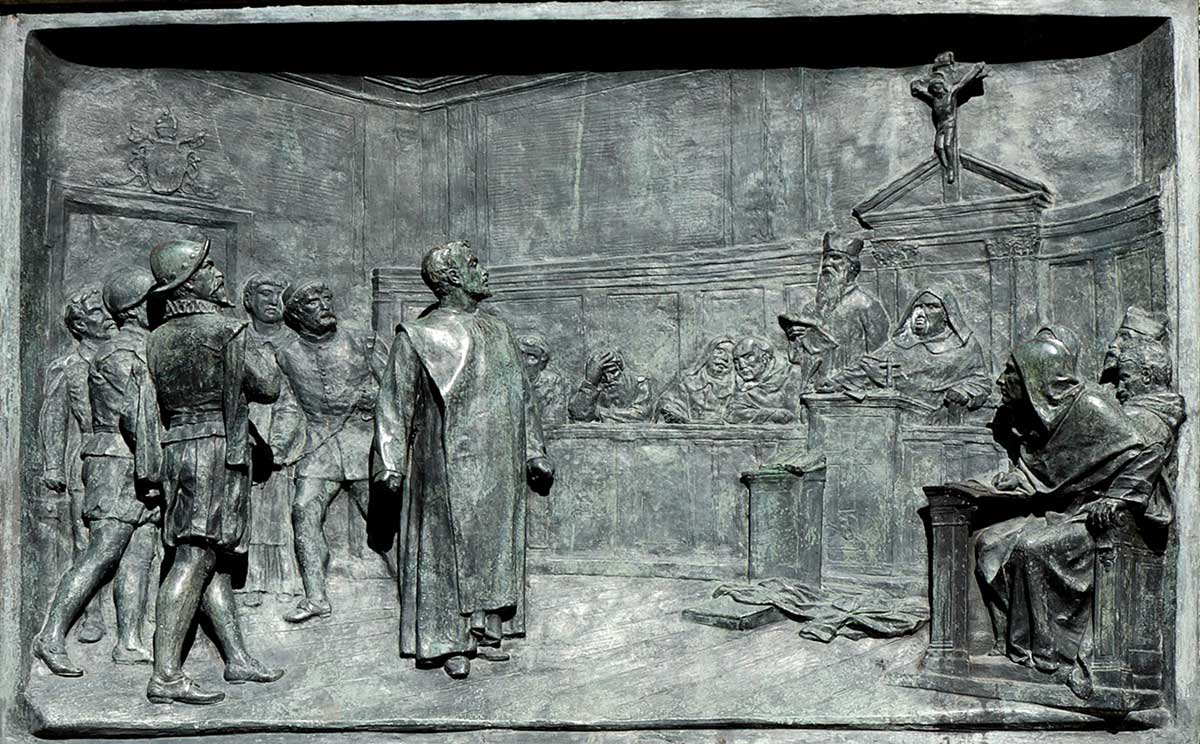
Giordano Bruno was a man of many identities - a monk, philosopher, cosmologist, and mathematician, who lived a brief yet impactful life between 1548 and 1600. He was a man who studied magic and briefly rose to prominence among European nobility due to his exceptional recall, which some attributed to hidden magical talents. However, Bruno was also labelled a heretic for his contentious views on the nature of the universe and his rejection of key Catholic teachings. Despite the fact that the Roman Inquisition burnt him at the stake, they were unable to obliterate his legacy. Today, many see Giordano Bruno as a martyr who was willing to confront power with the truth. But who was the man behind the labels?
Bruno was born in 1548 in Nola, near Naples, and entered a Dominican monastery as a teenager. He was ordained a priest in 1572, but after contemporaries discovered heretical texts in his possession, he was excommunicated and forced to flee. Bruno was a man who seemed to attract trouble wherever he went, and this was a familiar cycle for him. He resided in various Italian cities between 1576 and 1578, before leaving Italy and traveling around Europe in search of teaching employment or patronage. However, due to his penchant for disagreeing with local religious or political authorities, he struggled in this endeavor. In Geneva, for example, Bruno began to make a living as a theology professor, but after writing a thesis criticizing the president of the Genevan academy, he was obliged to apologize and leave the city immediately.
Despite these obstacles, Bruno was able to gain access to Henry III's court in France. He moved to Paris in 1581, where he became a lecturer and produced some works on memory, notably Circe's Song (1582) and The Art of Memory (1585). His reputation as a master of the 'mnemonic arts' (the art of memorization) truly took off here. Mnemonics was a popular practice in 16th-century Europe, and academics appreciated learning how to memorize speeches and writings as it hearkened back to the old Greek skill of rhetoric. After gaining some notoriety for his talents in the French court, Bruno decided to travel to London in 1584.
Upon his arrival in England, Bruno had already accepted his status as an academic firebrand. He defines himself as "Bruno from Nola, Academic of no Academy, called The Troublemaker" on the title page of his play The Candlebearer (1582). In England, he mostly caused difficulty by authoring a series of six works that probed his provocative beliefs about the nature of the universe. With titles such as On The Infinite Universe and Worlds (1584), Giordano Bruno was clearly willing to challenge Renaissance society's prevalent notion of a closed, finite universe.
Bruno argues vehemently in favor of many things that we now know to be true, such as the sun being at the center of the solar system, the Earth rotating on its axis, and the world itself being infinite, in these six works. The tragedy of Bruno's life was his inability to persuade anyone to believe his beliefs. However, 16th century cosmology was inextricably linked to Christian beliefs, and to argue against it was to argue against Christianity itself.
In the 1500s, Europeans thought the Earth (rather than the sun) was at the center of a single solar system. Humans were God's most superior creation, thus they had to be at the middle of everything. A border beyond the other planets and stars signified the beginning of the heavenly realm where God resided, encompassing the entire solar system with his divine presence. For many centuries, this view of the universe was the acknowledged norm in Europe.
Bruno's insistence on the limitless nature of the universe created severe theological quandaries. If the universe expanded indefinitely, where did God reside? And if the universe was infinite, what was the significance of humanity in the grand scheme of things? These were questions that many of his contemporaries were unwilling to grapple with, and as a result, Bruno was met with fierce resistance.
Despite this, Bruno's ideas were not completely without precedent. The ancient Greek philosopher Pythagoras had also believed in the infinity of the universe, and Bruno drew inspiration from his teachings. He also found support among a small group of like-minded individuals, who recognized the revolutionary nature of his ideas.
In the end, it was Bruno's refusal to recant his beliefs that led to his downfall. He was arrested by the Inquisition in 1592 and put on trial for heresy. He was offered the chance to recant his beliefs and save his life, but he refused, stating that "to recant would be to tell a lie." He was found guilty and sentenced to death by burning at the stake. As the flames consumed him, it is said that Bruno shouted "Perhaps you, my executioners, pronounce this sentence upon me with greater fear than I receive it!"

Bruno's death was a tragic end to a brilliant and unorthodox mind. But it was not the end of his legacy. His ideas on the infinity of the universe were eventually proven to be true, and today he is recognized as a pioneering thinker who dared to challenge the status quo. As he wrote in one of his works, "The limits of my language mean the limits of my world." Giordano Bruno pushed beyond those limits and expanded our understanding of the world we live in.



